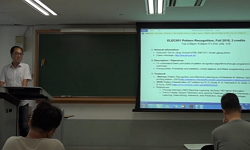This study aims to examine how EFL learners’ recognition and production of English conventional expressions are related to their overall English language learning achievement as measured by course grades. To this end, this study employed a recogniti...
http://chineseinput.net/에서 pinyin(병음)방식으로 중국어를 변환할 수 있습니다.
변환된 중국어를 복사하여 사용하시면 됩니다.
- 中文 을 입력하시려면 zhongwen을 입력하시고 space를누르시면됩니다.
- 北京 을 입력하시려면 beijing을 입력하시고 space를 누르시면 됩니다.

Recognition and Production of English Conventional Expressions in Relation to Academic Achievement
한글로보기https://www.riss.kr/link?id=A108407371
-
저자
정우현 (Yeungnam University)

- 발행기관
- 학술지명
- 권호사항
-
발행연도
2022
-
작성언어
English
-
주제어
관용표현 ; 인식 ; 발화 ; 학업성취도 ; production ; conventional expressions ; recognition ; academic achievement
-
등재정보
KCI등재
-
자료형태
학술저널
-
수록면
12-23(12쪽)
- DOI식별코드
- 제공처
-
0
상세조회 -
0
다운로드
부가정보
다국어 초록 (Multilingual Abstract)
This study aims to examine how EFL learners’ recognition and production of English conventional expressions are related to their overall English language learning achievement as measured by course grades. To this end, this study employed a recognition task and a production task implemented by 126 Korean and international university students. Analysis of individual conventional expressions showed that higher-level students scored much higher than their lower-level counterparts in recognizing 12 of 13 conventional expressions. Higherlevel students also demonstrated a greater production ability than their lower-level counterparts in 8 of 13 expressions. The higher-level students’ superiority to lower-level students was confirmed by their overall recognition and production scores. Another noticeable finding was that learners performed better on the recognition task than on the production task regardless of their language achievement levels. Closer examination revealed that there was a positive relationship between recognition and production of conventional expressions for the total number of students and for lower-level students. Based on these results, this study provides helpful suggestions for enhancing pragmatic knowledge of conventional expressions.
1 Roever, C., "What learners get for free: Learning of routine formulae in ESL and EFL environments" 66 (66): 10-21, 2012
2 Bardovi-Harlig, K, "Understanding second language process" Multilingual Matters 205-222, 2008
3 Blum-Kulka, S., "Too many words:Length of utterance and pragmatic failure" 8 (8): 165-180, 1986
4 Bardovi-Harlig, K., "The use of conventional expressions of thanking, apologizing, and refusing" 113-130, 2007
5 Winne, P. H., "The psychology of academic achievement" 61 : 653-678, 2010
6 Allen, D., "The impact of second language proficiency in dyadic peer feedback" 20 (20): 1-16, 2014
7 Bardovi-Harlig, K., "The effect of learning environment on the selection of conventional expressions on an aural multiple-choice DCT" 25 (25): 1-27, 2021
8 Bardovi-Harlig, K., "The effect of instruction on pragmatic routines in academic discussion" 19 (19): 324-350, 2015
9 Roever, C, "Testing ESL pragmatics: Development and validation of a web-based assessment battery" Peter Lang 2005
10 Cohen, A. D., "Teaching pragmatics in the second language classroom" 1 (1): 35-49, 2012
1 Roever, C., "What learners get for free: Learning of routine formulae in ESL and EFL environments" 66 (66): 10-21, 2012
2 Bardovi-Harlig, K, "Understanding second language process" Multilingual Matters 205-222, 2008
3 Blum-Kulka, S., "Too many words:Length of utterance and pragmatic failure" 8 (8): 165-180, 1986
4 Bardovi-Harlig, K., "The use of conventional expressions of thanking, apologizing, and refusing" 113-130, 2007
5 Winne, P. H., "The psychology of academic achievement" 61 : 653-678, 2010
6 Allen, D., "The impact of second language proficiency in dyadic peer feedback" 20 (20): 1-16, 2014
7 Bardovi-Harlig, K., "The effect of learning environment on the selection of conventional expressions on an aural multiple-choice DCT" 25 (25): 1-27, 2021
8 Bardovi-Harlig, K., "The effect of instruction on pragmatic routines in academic discussion" 19 (19): 324-350, 2015
9 Roever, C, "Testing ESL pragmatics: Development and validation of a web-based assessment battery" Peter Lang 2005
10 Cohen, A. D., "Teaching pragmatics in the second language classroom" 1 (1): 35-49, 2012
11 신유경, "Semantic Properties of Lexical Bundles Used by Young Adult Korean EFL Students at Different Grade Levels" 현대영어교육학회 23 (23): 10-21, 2022
12 DeBoer, A, "Second language learners’ recognition and production of conventional expressions: The role of proficiency, length of stay, and intensity of interaction" St. Cloud State University 2015
13 Bardovi-Harlig, K., "Proficiency, length of stay, and intensity of interaction and the acquisition of conventional expressions in L2 pragmatics" 8 (8): 347-384, 2011
14 Harsch, C., "Proficiency" 71 (71): 250-253, 2017
15 Taguchi, N., "Production of routines in L2 English:Effect of proficiency and study-abroad experience" 41 (41): 109-121, 2013
16 Bardovi-Harlig, K., "Pragmatics and language learning Vol. 12" University of Hawaii, National Foreign Language Resource Center 141-162, 2010
17 Bardovi-Harlig, K., "Pragmatics and language learning Vol. 12" University of Hawaii, National Foreign Language Resource Center 163-186, 2010
18 Sánchez-Hernández, A., "Pragmatic gains in the study abroad context: Learners’ experiences and recognition of pragmatic routines" 146 (146): 54-71, 2018
19 박유정, "Pragma-Linguistic Differences in Korean EFL Student Productions of Conventional Expressions" 한국영어교육학회 71 (71): 3-26, 2016
20 Pintrich, P. R., "Motivational and self-regulated learning components of classroom academic performance" 82 (82): 33-40, 1990
21 Alcón-Soler, E., "Learning pragmatic routines during study abroad: A focus on proficiency and type of routines" 39 (39): 191-210, 2017
22 Bardovi-Harlig, K, "Language learning, discourse and cognition in the tradition of Andrea Tyler" John Benjamins 193-211, 2018
23 Habok, A., "Investigating the relationship among English language learning strategies, language achievement, and attitude" 13 : 1-9, 2022
24 Sánchez-Hernández, A., "Investigating the learning of pragmatics across ages and contexts" Brill 141-164, 2019
25 MacDonald, M., "How language production shapes language form and comprehension" 26 : 1-16, 2013
26 Pawlak, M., "Grammar learning strategies as a key to mastering second language grammar: A research agenda" 53 (53): 358-370, 2020
27 Bardovi-Harlig, K., "Formulas, routines, and conventional expressions in pragmatics research" 32 : 206-227, 2012
28 House, J., "Developing pragmatic fluency in English as a foreign language: Routines and metapragmatic awareness" 18 (18): 225-252, 1996
29 Taguchi, N., "Corpus-informed assessment of L2 comprehension of conversational implicature" 43 (43): 738-749, 2009
30 Bardovi-Harlig, K., "Conventional expressions as a pragmalinguistic resource: Recognition and production of conventional expressions in L2 pragmatics" 59 (59): 755-795, 2009
31 Kecskes, I., "Conceptual fluency and the use of situation-bound utterances" 7 : 145-161, 2000
32 Bardovi-Harlig, K., "Awareness of meaning of conventional expressions in second language pragmatics" 23 (23): 41-56, 2014
33 Kepner, C. G., "An experiment in the relationship of types of written feedback to the development of second-language writing skills" 75 (75): 305-313, 1991
34 Tajeddin, Z., "Acquisition of pragmatic routines by learners of L2 English:Investigating common errors and sources of pragmatic fossilization" 21 (21): 1-21, 2017
35 Barron, A, "Acquisition in interlanguage pragmatics:Learning how to do things with words in a study abroad context" John Benjamins 2003
동일학술지(권/호) 다른 논문
-
- 현대영어교육학회
- Gordon, Christopher
- 2022
- KCI등재
-
- 현대영어교육학회
- Jae-hyun Im
- 2022
- KCI등재
-
- 현대영어교육학회
- 이지영
- 2022
- KCI등재
-
- 현대영어교육학회
- 전윤실
- 2022
- KCI등재




 KCI
KCI KISS
KISS







